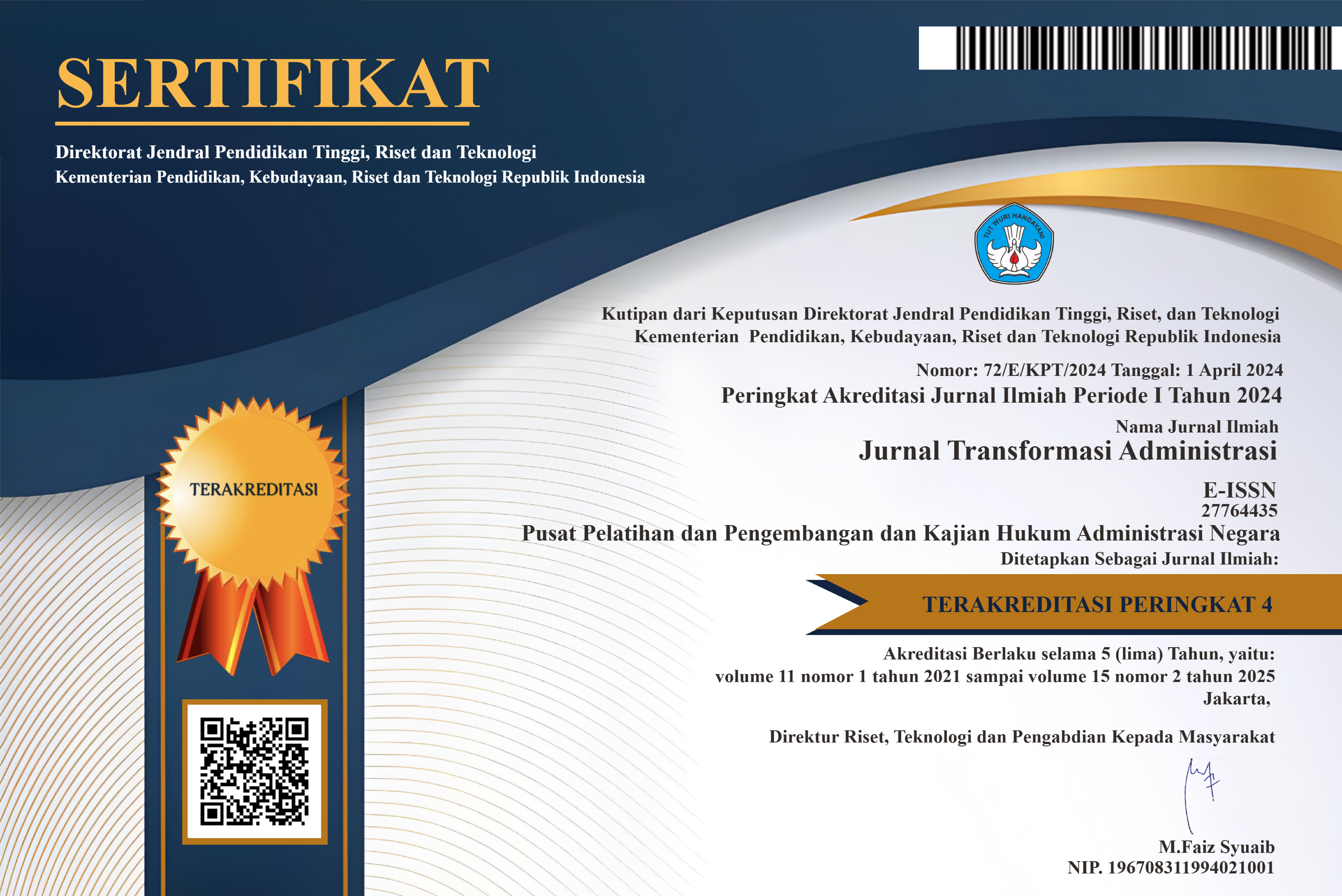Study On The Development Of Socio-Cultural Competence For Regional Civil Servant (Case Study In Aceh And North Sumatra)
Keywords:
civil servant, development, socio-cultural competenceAbstract
The Law of State Civil Apparatus mandates Civilian Personel to possess the competencies of technical, managerial, and socio-cultural in carrying out their duties and functions. Sociocultural is a new competence introduced in the Law of State Civil Apparatus that could be measured from work experience related to the society in terms of religion, ethnicity and culture in improving national vision. In practice, there were already policies to accommodate the implementation of socio-cultural competence. One of these policies was made by the Provincial Government of Jakarta, namely competence of social sensitivity. Although it has a different name, the competence of socio-cultural and the competence of social sensitivity have the same meaning in substance. This research has identified the potential for socio-cultural values that exist in the region of Aceh and North Sumatra to be indicated as socio-cultural competence, and then to do an analysistoward the development strategy of socio-cultural competence in the region. By using qualitative methodand data collection through focus group discussions and interviews, the results of analysis showed that the historical aspects, pluralist and challenges of regional development had greatly influenced the formation of socio-cultural values. There was a lot of value identified which then classified specifically and in general. The purpose was to made a priority scale of values that can be used as a socio-cultural competence in a scale of local/specific, which then can be applied generally or nationally. In relation to the needs of development, both locus show that the level of needs was very high due to the heterogeneity exists in both regions. For its development strategy, the regions expect standard implementation as a parameter to be measured in order to improve the competence of the civil apparatus.
References
Daryanto, M. 1998. Administrasi Pendidikan. Rineka Cipta. Jakarta.
Dessler, Gary. 2006. Manajemen Sumber Daya Manusia. Edisi ke sepuluh. PT Intan Sejati. Klaten.
Enda. 2010. Ilmu Perilaku Kesehatan. Rineka Cipta. Jakarta.
Komara. 2007. Analisis Faktor-Faktor yang Mempengaruhi Kinerja Sistem Informasi Akuntansi. Simposium Nasional Akuntansi 8. Solo.
Mubarak, W.I. 2012. Sosiologi. Salemba Medika. Jakarta.
Murgiyono. 2002. Kompetensi Dasar PNS, Konsep Pemikiran Manajemen SDM PNS Berbasis Kompetensi. Jakarta.
Noor, Fuad. 2009. Integreted HRD. Grasindo. Jakarta.
Sartini. 2009. Mutiara Kearifan Lokal Nusantara. Kepel Press, Yogyakarta.
Sirtha, I Nyoman. 2003. Aspek Hukum Dalam Konflik Adat di Bali, Udayana University Press, Denpasar.
Sumardi. 2007. Password Menuju Sukses: Rahasia Membangun Sukses Individu, Lembaga, dan Perusahaan. Erlangga. Jakarta.
Subagyo, Ahmad. 2008.Studi Kelayakan Teori dan Aplikasi. Jakarta: Elex Media Komputindo.
Susilo, Willy. 2001. Audit SDM: Perpaduan Komprehensif Auditor dan Praktisi Manajemen Sumber Daya Manusia Serta Pimpinan Organisasi/ Perusahaan. Gema Amini.
Umam, Khairul (2010). Prilaku Organisasi. Bandung. Pustaka Setia
Peraturan
Undang-Undang Dasar Tahun 1945
Undang-Undang Nomor 11 Tahun 2006 tentang Pemerintahan Aceh
Nomor 5 Tahun 2014 tentang Aparatur Sipil Negara (ASN)
Peraturan Gubernur Provinsi DKI Jakarta Nomor 52 Tahun 2013 tentang Perubahan Atas Peraturan Gubernur Nomor 132 Tahun 2012 tentang Standar Kompetensi Jabatan Struktural Eselon 1, Eselon II, Eselon III, Eselon IV dan Eselon V.















